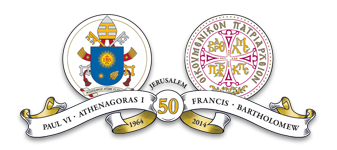 Address of Ecumenical Patriarch Bartholomew at the Environmental Symposium, Saint Barbara Greek Orthodox Church, Santa Barbara, California
Address of Ecumenical Patriarch Bartholomew at the Environmental Symposium, Saint Barbara Greek Orthodox Church, Santa Barbara, California
Press Release: Religion, Science and the Environment Symposium VI: The Amazon River
AMAZON ENVIRONMENTAL SYMPOSIUM
ANNOUNCED BY ECUMENICAL PATRIARCH BARTHOLOMEW
Istanbul, 24 June 2006 – Over 200 religious leaders, scientists, environmentalists, and government officials from Brazil and around the world will gather on the Amazon River this July to examine the environmental challenges and ethical issues relating to
the protection of nature, the spiritual leader of the Eastern Orthodox Church, HAH Ecumenical Patriarch Bartholomew announced today.
The eight–day Amazon Symposium will take place from July 13-20, 2006, and will be held under the auspices of HAH Ecumenical Patriarch Bartholomew and United Nations Secretary General Kofi Annan. Beginning in Manaus and traveling up the
river in ten boats, the Symposium will visit various environmental sites, giving the delegates an opportunity to examine the Amazon's conditions with their own eyes and to meet and discuss issues with local residents and experts. On 16 July, in the presence of hundreds of honored guests and dignitaries, the assembled religious leaders will bless the blue waters of the Amazon and the dark waters of the Rio Negro at the confluence of the two rivers.
"I am very pleased to have the privilege to visit the great nation of Brazil and its crown jewel, the Amazon. The Amazon symbolizes the magnificence and the vulnerability of God's creation. The loss of the rainforest poses one of the greatest challenges of our time. It touches not only the indigenous and traditional people who live in the rainforest, but all of humankind," said Ecumenical Patriarch Bartholomew. "I look forward to learning about the Amazon from Brazil's leaders and citizens, so
that we may together explore the possibility of greater cooperation and aspire toward an ethic that is more protective of our cherished environment."
The Symposium will begin in Manaus, with visits to the SIVAM satellite mapping facilities and the ZF2 rainforest observation tower, and will travel to Santarem, Jau National Park, the Anavilhanas archipelago and Mamiraua. Throughout the voyage, international and regional delegates will discuss topics ranging from environmental ethics to specific issues relating to the Amazon, such as deforestation and biodiversity loss, the introduction of genetically modified organisms into Amazon ecosystems, the rights and struggles of indigenous and traditional peoples and the Amazon's impact on global climate change.
Speakers and delegates expected to participate include noted religious leaders, such as HE Metropolitan John of Pergamon; HE Cardinal Etchegaray; and distinguished public figures, including Virgilio Viana, Amazonas Secretary of State for Environment; Congressman Fernando Gabeira; Roberto Smeraldi, Director, Friends of the Earth, Brazilian Amazonia; Muriel Saragoussi, Secretary for Amazon Coordination, Brazilian Ministry of Environment; Ricardo Sanchez Sosa, Director and Regional Representative, United Nations Environment Programme; Sir Ghilean Prance, Scientific Director, The Eden Project; Rosalia Arteaga, General Secretary of the Amazon Treaty Organization; John Hemming, former Director and Secretary of the Royal Geographic Society; environmental activist Vandana Shiva and a number of other noted scientific, environmental and government figures.
Religion, Science and the Environment (RSE) is a non-governmental organisation based in Athens, Greece. Established in 1995, RSE seeks to provide common ground among the worlds of religion, science and the environment in the interest of protecting the environment. This mission has been addressed by holding five waterbased symposia – Symposia I on the Aegean Sea (1995), Symposium II on the Black Sea (1997), Symposium III on the Danube River (1999), Symposium IV on the Adriatic Sea (2002) and Symposium V on the Baltic Sea (2003) as well as creating the Halki Ecological Institute and other training initiatives. RSE's programs aim to raise awareness of the plight of the world's waters; to strengthen local capacities for environmental protection; and to catalyse projects that will benefit targeted water bodies. The organisation's strategies are animated by a core belief that the analytical tools of science and the spiritual messages of religion must work in harmony if the earth's environment is to be safeguarded against further degradation.
